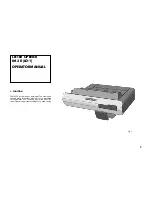
The tool actually shut off at the peak labeled point #2. Once the power driving the bit was
shut off, regardless of the means, the bit rebounded off the drive of the fastener, and created
a backlash through the drive mechanism of the tool. This created torque in the opposite
direction, as displayed by the line running from point #2 to point #3. The components of
the tool drive continued to rebound off each other, as shown in points #4, #5, and the rest of
the line to the right of them, until it stabilized at zero.
The graph discloses a number of peaks during fastener rundown, as well as those occurring
at and after tool shutoff. This type of action - not identical, but similar - occurs with all
non-impacting power tool types on all joints. There are many variables involved: the power
tool type, the individual tool, the fasteners, the joint rate, the tool power supply, rundown
speed, the tool's shutoff mechanism, and the broad variety of the interactions between them.
These sources of mechanical "noise" create the electronic noise that must be eliminated to
determine what will be the actual applied torque on the fastener.
It is the filter, augmenting the joint rate emulation of the joint simulator, which permits
effective off-line calibration with confidence the results on the tester will correlate with the
results in the assembly process.
There are five (5) filters provided on each
Torq-Tronics
®
. The filters are numbered 0, 1, 2,
3, and 4. Each filter provides a different amount of noise reduction, with Filter 0 having the
most filtering and Filter 4 the least.
Since there are only five filters, and there is an extraordinary variety of joints and power
tools on which the tester might be used (and more power tools and applications coming out
every year), learning to balance the joint simulator and the filters is a key to assuring a suc-
cessful power tool testing program.
Summary of Contents for 10191
Page 2: ......
Page 6: ......
Page 8: ...This page intentionally left blank...
Page 12: ...This page intentionally left blank...
Page 34: ...This page intentionally left blank...
Page 40: ...This page intentionally left blank...
Page 46: ...This page intentionally left blank...
Page 51: ......
















































